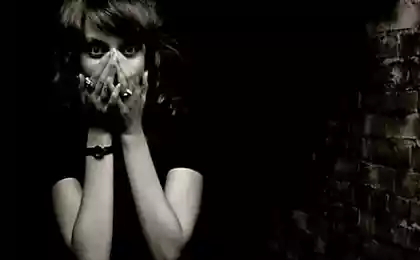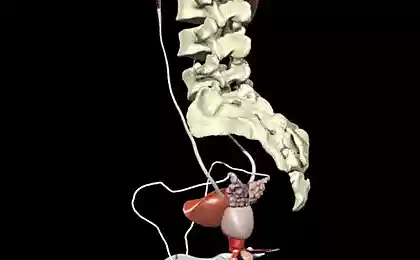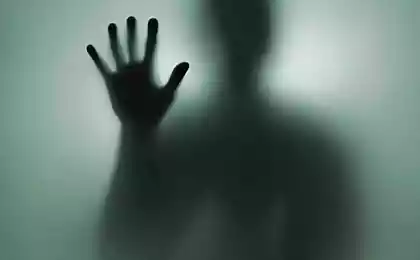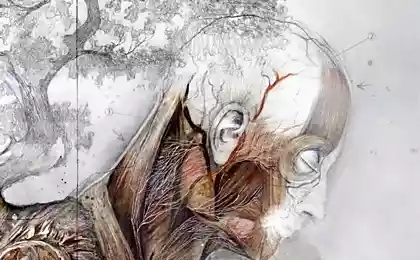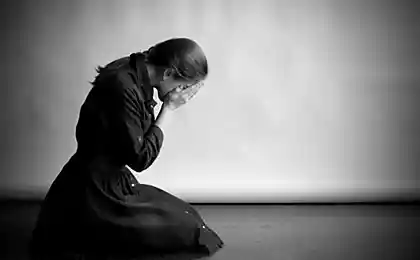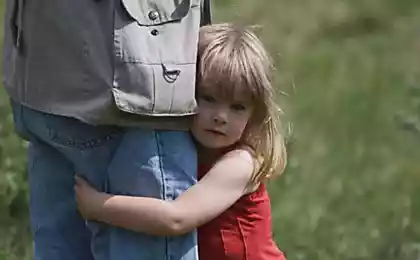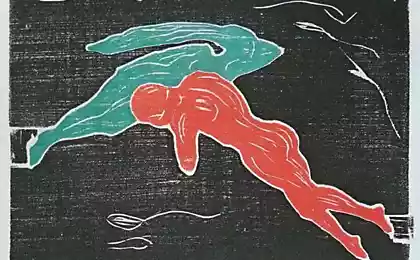520
"Terrible" interest: when close is passionate about "horror"
Every man at least once in their life watched a horror movie. Somebody for someone – because it is fashionable, and someone who is so regularly and with such high interest that the relatives begin to worry. Why is this happening, is it worth it to take action? We spoke to clinical psychologist Daniel Rastorgueva.
Masochistic tendencies and overcoming the emotions of fear
Someone throws some things in a bag and went skiing, someone "rides" on the kart, someone who every Friday goes to a small theater across the street. And someone is home, includes another (or the same) is a horror movie. Different people, different Hobbies and habits. But one thing unites them – getting emotions.
The emotion is the manifestation of the subjective attitude of man to reality and to himself. To control them completely is sometimes impossible.
Emotions are a separate class of mental phenomena, processes and conditions related to instincts, needs and motives.
Ninety two million nine hundred thirty four thousand two hundred thirty seven
The need for love, respect, joy for us is natural. So we watch cartoons, strive for achievements in sports, work, etc. But why do some of us there is a need in watching horror movies, what is here is the motive?
Viewing "horror", no matter how primitive it may seem, is nothing more than a way to cause emotions, claims clinical psychologist Daniel Rastorguev. What makes any emotion in the first place? It makes us alive. After all, only feeling, experiencing, we understand that we live, not exist.
In this case, viewing the "horror" is just the extra stimulation of getting the emotions of the shortest, albeit not the usual way. In this case the emotion of fear.
For the emotion of fear hides the overcoming of cowardice, in a way that is typical for people with masochistic tendencies, says the psychologist.
What is masochism? This tendency to pleasure, experiencing humiliation, violence or torture. Accordingly, a person watching a horror movie, forcing myself to experience the emotions that he is afraid and who subconsciously does not want to experience, but experiencing. At the end of the viewing person understands that experiencing these emotions, he allegedly overcame himself, and thus self-esteem. There is a reason for pride – "I was able, I did it."
Typically, these people do not know how to cope with their fears in everyday life as is simply not adapted to them. So that though somehow to justify, to increase your self esteem, the person artificially simulates the situation in which he controls everything. When viewing the "horror" he experiences similar feelings, emotions, experiences. But he copes with them. In the end, self esteem is restored due to the fact that at least he mastered the emotion.
Yes, it's not the adaptive mechanism, the effect is not as big, most likely nothing will, but we cannot say that it is unacceptable behavioral tactics.
What happens when a child first watches a horror film?
"What's the reaction to the first viewing of a horror film? Do you remember your first TV viewing? For the child what is happening in this "box" is the continuation of reality," says the psychologist. He has a feeling that if you look inside, he will see the world that is shown on the screen. Accordingly, experiences that occur within this "box" is very real. So, if a child is watching horror from a very early age, his experiences turn out to be fantastic. Yes, it is a strong emotion with which to cope the child is still not able and it is, of course, to some extent, can affect the psyche of the child, but the cause of deliberate aggression – no.
Can a scary movie cause psychological disorders of man?
The problem of mental disorder or mental illness is, says Daniel Rastorguev — that the person with this problem in any case there is a predisposition to it. Can become a kind of "trigger", the trigger? The answer is Yes. There are many actual stories of schizophrenic patients who all his life lived quietly without any signs of abnormalities, but they had a predisposition to it. Once they are "touched" with alcohol, this time talked with someone about something "high", and the next day they come psychotic attacks, and since the man is schizophrenia. Based on this, the "trigger" can be anything. Accordingly, a horror movie too. A nightmare can be all-consuming and able to start a process violation.
What to do if you notice your child is fascinated by "horror"?
Look at the problem differently: teenagers such "nonsense" can do in our time that watching horror films – not the most terrible that can be. Of the nightmare that could happen to him on the street, let it be this version, albeit better than sitting and watching.
If your child is looking at all these things, it is highly unlikely that he will repeat the same thing in life. It is important to understand why the child has increased interest into this category of cinema? You can also restrict viewing, but what caused him to remain, and it will be another way to vent your emotion – fear and aggression. If you notice an increased attention to horror movies, psychologists are advised to think about the fact that if you block the access to this occupation, he will find another, which could be a lot worse.
Yes, it's unpleasant display, but the recommendation of a psychologist — in any case not to stop the hobby. Talk to your child, try to understand. In any case, do not use language kind "you're not like that", "you're doing it wrong". Be softer, encourage your child to share what he cares about, open the issue in the dialogue. Try to watch with him a movie. Follow the diagram "cause – result", where result of what is happening becomes a horror film. The Foundation of this uvlecheniye to be quite simple: this movie/show is so fashionable, or it's very discussed in his circle. Or Vice versa, the result can be unpleasant. For example, the child says "I hate all people so I like to watch such films, but it makes me happy." But it will be a call to action.
What actions to take in this situation?
The first thing that comes to mind – says psychologist Daniel Rastorguev, — "to pull" or lure the child to a psychologist to understand professionals. But most parents forget that psychotherapy is irresponsible for a person of age is not seen as separate from the family unit, and how its full part. It is considered as family psychotherapists, including Carl Whitacre, Paul watzlawick, Marina Bebchuk, etc. If a child "slut", aggressive or conversely, overly childish for their age, the demand in the first place with parents. So much more important to understand the deeper root causes.
A well-known fact: children under the age of majority are projecting the behavior and emotional state of their parents and immediate family. It only reflects trends that are present in the family. In this regard, if you notice that something is wrong in the child's behavior, ask yourself the question: if you were in the relationship with husband/wife, do you live, if you're happy and you hate the whole world, and the child sees it? This problem is solved only in the complex. By itself, the child is innocent. If there is a need to go to a psychologist, you need to go all together, or at least the two of us. Preferably the child not to talk about the reason for the visit to the specialist. And it is in any case not to voice that this is due to the situation, when he said he hates everyone. Otherwise, the child will begin to suppress their emotions, and as a result can be psychosomatic diseases or other disorders.
What age child can be allowed to meet with "horror" and violence in principle, which in any case expect it in real life?
Here it is worth noticing two points. You are the parent and only you decide when your child to look at it, and watch it at all. Trust yourself is the best guideline. If you are in doubt about their feelings, then you need to focus on the common constraints from the experts: "0+", "6+", "12+" But our psychologist Daniel Rastorguev recommends to listen to the first option, saying "this is my child, why should I listen to strangers".
To begin with – with the baby we need to talk about the fears, the difficulties. According to psychologist, it must address the father as an image of strength and courage for him. And then to show how look fears.
The problem of "horror" in adulthood
For example, in childhood, the moment was lost as a teenager – blamed on puberty. And here the person is an adult and you notice him frequent viewings of "horror" and at the same time manifested violent outbursts. How to explain this?
Such a person is likely to have poor knows how to deal with their affects: shame, fear, anger etc. Based on the hypothesis that he was not able to experience fear, his anger is a result of this subject than is associated with watching terrible movies. He's probably the only way he knows how to interact with their passions.
How it to adjust?
Two outputs:
a partner – then suddenly it adult someone corrects; you are not his mom/dad, and what to watch than to get involved in – it's a private business, partnership implies a position making a person, not a correction;
from the perspective of a friend – to try to use dialogue in line with "I noticed(a) that you are passionate about(a) such films, why, and what emotions it evokes in you"? Only in this case, a person may be disclosed: to say that he thinks this is normal, or to share if there is a problem.
Conclusion: a direct relationship between watching horror films and aggression there. This is just a way of energy release.
In extreme cases
If you notice the person with whom you are forced to be around (e.g. at work), elevated, healthy interest in horror movies, and it looks somehow suspicious in and of itself all doubtful, and his eyes, at times, causes tremors, you'd better not meddle with it – suggest psychologists. This is a more serious case and, most likely, there is present a mental disorder to predict the reaction will not work, so do not complicate your life, leave him alone with your passion.
In conclusion: if your loved one is fond of horror movies, it is not necessary to do hasty conclusions and to classify it to the people with unhealthy thoughts. Analyze the situation, talk to the man. Perhaps there is no problem. Be attentive to loved ones. published
Author: Alena Bykova
P. S. And remember, just changing your mind - together we change the world! © Join us at Facebook , Vkontakte, Odnoklassniki
Source: Alena Bykova
Masochistic tendencies and overcoming the emotions of fear
Someone throws some things in a bag and went skiing, someone "rides" on the kart, someone who every Friday goes to a small theater across the street. And someone is home, includes another (or the same) is a horror movie. Different people, different Hobbies and habits. But one thing unites them – getting emotions.
The emotion is the manifestation of the subjective attitude of man to reality and to himself. To control them completely is sometimes impossible.
Emotions are a separate class of mental phenomena, processes and conditions related to instincts, needs and motives.
Ninety two million nine hundred thirty four thousand two hundred thirty seven
The need for love, respect, joy for us is natural. So we watch cartoons, strive for achievements in sports, work, etc. But why do some of us there is a need in watching horror movies, what is here is the motive?
Viewing "horror", no matter how primitive it may seem, is nothing more than a way to cause emotions, claims clinical psychologist Daniel Rastorguev. What makes any emotion in the first place? It makes us alive. After all, only feeling, experiencing, we understand that we live, not exist.
In this case, viewing the "horror" is just the extra stimulation of getting the emotions of the shortest, albeit not the usual way. In this case the emotion of fear.
For the emotion of fear hides the overcoming of cowardice, in a way that is typical for people with masochistic tendencies, says the psychologist.
What is masochism? This tendency to pleasure, experiencing humiliation, violence or torture. Accordingly, a person watching a horror movie, forcing myself to experience the emotions that he is afraid and who subconsciously does not want to experience, but experiencing. At the end of the viewing person understands that experiencing these emotions, he allegedly overcame himself, and thus self-esteem. There is a reason for pride – "I was able, I did it."
Typically, these people do not know how to cope with their fears in everyday life as is simply not adapted to them. So that though somehow to justify, to increase your self esteem, the person artificially simulates the situation in which he controls everything. When viewing the "horror" he experiences similar feelings, emotions, experiences. But he copes with them. In the end, self esteem is restored due to the fact that at least he mastered the emotion.
Yes, it's not the adaptive mechanism, the effect is not as big, most likely nothing will, but we cannot say that it is unacceptable behavioral tactics.
What happens when a child first watches a horror film?
"What's the reaction to the first viewing of a horror film? Do you remember your first TV viewing? For the child what is happening in this "box" is the continuation of reality," says the psychologist. He has a feeling that if you look inside, he will see the world that is shown on the screen. Accordingly, experiences that occur within this "box" is very real. So, if a child is watching horror from a very early age, his experiences turn out to be fantastic. Yes, it is a strong emotion with which to cope the child is still not able and it is, of course, to some extent, can affect the psyche of the child, but the cause of deliberate aggression – no.
Can a scary movie cause psychological disorders of man?
The problem of mental disorder or mental illness is, says Daniel Rastorguev — that the person with this problem in any case there is a predisposition to it. Can become a kind of "trigger", the trigger? The answer is Yes. There are many actual stories of schizophrenic patients who all his life lived quietly without any signs of abnormalities, but they had a predisposition to it. Once they are "touched" with alcohol, this time talked with someone about something "high", and the next day they come psychotic attacks, and since the man is schizophrenia. Based on this, the "trigger" can be anything. Accordingly, a horror movie too. A nightmare can be all-consuming and able to start a process violation.
What to do if you notice your child is fascinated by "horror"?
Look at the problem differently: teenagers such "nonsense" can do in our time that watching horror films – not the most terrible that can be. Of the nightmare that could happen to him on the street, let it be this version, albeit better than sitting and watching.
If your child is looking at all these things, it is highly unlikely that he will repeat the same thing in life. It is important to understand why the child has increased interest into this category of cinema? You can also restrict viewing, but what caused him to remain, and it will be another way to vent your emotion – fear and aggression. If you notice an increased attention to horror movies, psychologists are advised to think about the fact that if you block the access to this occupation, he will find another, which could be a lot worse.
Yes, it's unpleasant display, but the recommendation of a psychologist — in any case not to stop the hobby. Talk to your child, try to understand. In any case, do not use language kind "you're not like that", "you're doing it wrong". Be softer, encourage your child to share what he cares about, open the issue in the dialogue. Try to watch with him a movie. Follow the diagram "cause – result", where result of what is happening becomes a horror film. The Foundation of this uvlecheniye to be quite simple: this movie/show is so fashionable, or it's very discussed in his circle. Or Vice versa, the result can be unpleasant. For example, the child says "I hate all people so I like to watch such films, but it makes me happy." But it will be a call to action.
What actions to take in this situation?
The first thing that comes to mind – says psychologist Daniel Rastorguev, — "to pull" or lure the child to a psychologist to understand professionals. But most parents forget that psychotherapy is irresponsible for a person of age is not seen as separate from the family unit, and how its full part. It is considered as family psychotherapists, including Carl Whitacre, Paul watzlawick, Marina Bebchuk, etc. If a child "slut", aggressive or conversely, overly childish for their age, the demand in the first place with parents. So much more important to understand the deeper root causes.
A well-known fact: children under the age of majority are projecting the behavior and emotional state of their parents and immediate family. It only reflects trends that are present in the family. In this regard, if you notice that something is wrong in the child's behavior, ask yourself the question: if you were in the relationship with husband/wife, do you live, if you're happy and you hate the whole world, and the child sees it? This problem is solved only in the complex. By itself, the child is innocent. If there is a need to go to a psychologist, you need to go all together, or at least the two of us. Preferably the child not to talk about the reason for the visit to the specialist. And it is in any case not to voice that this is due to the situation, when he said he hates everyone. Otherwise, the child will begin to suppress their emotions, and as a result can be psychosomatic diseases or other disorders.
What age child can be allowed to meet with "horror" and violence in principle, which in any case expect it in real life?
Here it is worth noticing two points. You are the parent and only you decide when your child to look at it, and watch it at all. Trust yourself is the best guideline. If you are in doubt about their feelings, then you need to focus on the common constraints from the experts: "0+", "6+", "12+" But our psychologist Daniel Rastorguev recommends to listen to the first option, saying "this is my child, why should I listen to strangers".
To begin with – with the baby we need to talk about the fears, the difficulties. According to psychologist, it must address the father as an image of strength and courage for him. And then to show how look fears.
The problem of "horror" in adulthood
For example, in childhood, the moment was lost as a teenager – blamed on puberty. And here the person is an adult and you notice him frequent viewings of "horror" and at the same time manifested violent outbursts. How to explain this?
Such a person is likely to have poor knows how to deal with their affects: shame, fear, anger etc. Based on the hypothesis that he was not able to experience fear, his anger is a result of this subject than is associated with watching terrible movies. He's probably the only way he knows how to interact with their passions.
How it to adjust?
Two outputs:
a partner – then suddenly it adult someone corrects; you are not his mom/dad, and what to watch than to get involved in – it's a private business, partnership implies a position making a person, not a correction;
from the perspective of a friend – to try to use dialogue in line with "I noticed(a) that you are passionate about(a) such films, why, and what emotions it evokes in you"? Only in this case, a person may be disclosed: to say that he thinks this is normal, or to share if there is a problem.
Conclusion: a direct relationship between watching horror films and aggression there. This is just a way of energy release.
In extreme cases
If you notice the person with whom you are forced to be around (e.g. at work), elevated, healthy interest in horror movies, and it looks somehow suspicious in and of itself all doubtful, and his eyes, at times, causes tremors, you'd better not meddle with it – suggest psychologists. This is a more serious case and, most likely, there is present a mental disorder to predict the reaction will not work, so do not complicate your life, leave him alone with your passion.
In conclusion: if your loved one is fond of horror movies, it is not necessary to do hasty conclusions and to classify it to the people with unhealthy thoughts. Analyze the situation, talk to the man. Perhaps there is no problem. Be attentive to loved ones. published
Author: Alena Bykova
P. S. And remember, just changing your mind - together we change the world! © Join us at Facebook , Vkontakte, Odnoklassniki
Source: Alena Bykova

